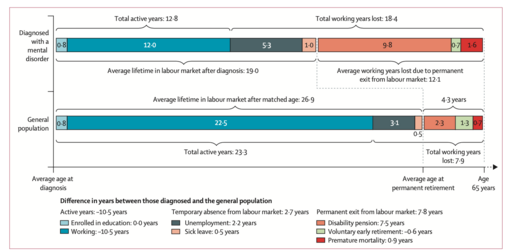People with mental disorders lose years of their working life
A new study from Aarhus University shows that people diagnosed with a mental disorder on average work 10.5 years less compared with the general population. The study is the first to map an estimate of working years lost associated with mental disorders.


By looking at the data of all people aged 18-65 years registered in Denmark over a period of 22 years, researchers from Aarhus University have been able to shed light on some of the consequences faced by those diagnosed with a mental disorder.
The study followed a total of 5,163,321 individuals in Denmark, 488,775 of whom were diagnosed with a mental disorder. The researchers found that all diagnosed mental disorders are associated with a substantial loss of working life. And while it is not new that people with mental disorders are at a higher risk of being unemployed or on a disability pension, the study is the first to quantify an estimated measure of time lost, explains leading author of the study, Associate Professor Oleguer Plana-Ripoll from the Department of Epidemiology at Aarhus University:
“It is not surprising that people diagnosed with mental disorders experience more time outside the workforce, we already knew that. But the magnitude surprised us, losing an average of 10.5 years of working life is a lot,” he says.
Information on mental disorders was obtained from the Danish Psychiatric Central Research Register and information on labour market characteristics was obtained from administrative registers, giving the researchers a precise overview of the impact of mental disorder diagnoses.
For Oleguer Plana-Ripoll, the findings showcase the substantial impact mental disorders have on the life of those diagnosed.
“Our study shows that patients with mental disorders to a very high degree are more unable to work or study compared to the average Danish population. There is a need to invest in programmes that reduce the number of working years lost and assist people with mental disorders in returning to the workforce,” he explains.
Schizophrenia has the biggest impact
The researchers first looked at the overall number of working years lost associated with all mental diagnoses combined, landing on an average of 10.5 years. Afterwards, the researchers also broke it down into 24 specific types of mental diagnoses, revealing that some diagnoses impact the patient’s ability to work or study more than others. The study found that people diagnosed with schizophrenia lose, on average, 24 years of working life after receiving the diagnosis. Whereas people diagnosed with single or recurring depression lose around 10 years.
In the study, those diagnosed with mental disorders are the ones who have received treatment in the psychiatric system; thus, for some disorders such as depression or anxiety, they are considered to be more severe cases. But even though milder cases of depression and anxiety do not figure in the data used, those affected will most likely also experience time lost from studying or working, says Oleguer Plana-Ripoll.
“The cases of depression and anxiety diagnoses we have in this data set are the more severe cases who seek help from a psychiatrist. But there are many more cases who are treated by their own physician or might not receive treatment at all. While the average working life lost for these individuals is likely to be lower, we expect that mild cases of mental disorders are also associated with a reduction in working life because we observed that all types of mental disorders are to some extent,” he explains.
Time lost to disability pension going down
The researchers also found that the number of working years lost due to disability pension was almost cut in half in Denmark between 1995 to 2016. This coincides with a policy reform passed in 2013, making it harder for especially younger people to receive a disability pension. In 1995-2000, working years lost due to a disability pension amounted to 9.7 years. This dropped to 5.2 years in the period 2011-2016. However, that decrease has almost been matched by a similar increase in working years lost due to sick leave or unemployment, going up from 1.8 to 4.4 years. A connection Oleguer Plana-Ripoll hopes to pursue in another study.
“This study was descriptive, meaning we just looked at and summarised the numbers. We plan to conduct a new study in which we will examine the reasons behind these numbers, as well as take a deeper look into the possible effects of the 2013 reform.”
About the study:
- Type: Register-based prospective cohort study including all individuals aged 18-65 years living in Denmark between 1995 to 2016.
- Collaborations: Collaboration between the Department of Clinical Epidemiology at Aarhus University and the National Center for Register-based Research
- Eksternal funding: Lundbeck Foundation and Danish National Research Foundation
- Conflicts of interest: None
- Read the scientific articler: https://www.thelancet.com/journals/lanpsy/article/PIIS2215-0366(22)00376-5/fulltext
Contact
Associate Professor Oleguer Plana-Ripoll
Aarhus University, Department of Clinical Medicine - Department of Clinical Epidemiology
Email: opr@clin.au.dk
Tel.: +45 8716 6034
